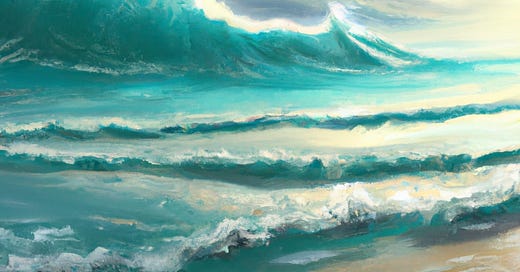The horizon stretched out endlessly before me. I felt an almost indescribable sense of infinity.
Taking a few steps forward, I dipped my toes into the foamy surf.
And then I was at my keyboard, feeling the same sense of awe as I reached for the address bar and began to search the seemingly vast depths of the internet.
Without a thought, I walked knee-deep into the water and found myself on Twitter. I reclined in my office chair and began to scroll.
Pulled by a subtle undertow, I found myself deep enough to swim a little. This was comfortable. I found myself clicking on links to blog posts, newsletters, and podcasts. The tabs were piling up, but I was energized by the content. I was learning. So I continued to scroll. I continued to swim.
Ever deeper, the tug of the water grew stronger. The number of tabs ballooned as I clicked on more links. My attention was too valuable for the social media site to let go, and I felt a tug on my legs. Dark monsoon clouds appeared overhead. The innocent undertow raged into a rip current, and I was dragged into a cauldron of tempestuous foam.
With a sickening realization that I had no control of myself, my mind spun with fatigue. Content swirled endlessly around me, some good and some bad. I couldn’t tell anymore. Through it all, I couldn’t stop scrolling and clicking. I had been eclipsed by the doom-scroll.
A Surfboard - Really Simple Syndication (RSS)
In the deep chasms of the internet, an unkillable technology lies awake. It’s been around for a very long time in internet-years (since 1999). There were moments it thrived and there were moments where people declared its death. But it persisted. And in my view, it’s due for a renaissance.
Really Simple Syndication (henceforth known as RSS) allows one to aggregate content from across the internet. It supports blog posts, podcasts, newsletters and more.
Think of an RSS feed like a newspaper delivery service for websites. Instead of visiting each website or podcast individually to read the latest articles, the RSS "paperboy" collects new content from your favorite sites and rolls them together into a newspaper. It then delivers your newspaper directly to your "digital doorstep" (your RSS reader). This way, you can easily skim through the headlines and read or listen to what interests you without having to check multiple websites manually.
Almost every website and podcast has an RSS feed. Every Substack, Ghost and WordPress site, for example, has one by default. With those three alone, you can subscribe to most of the internet’s content via RSS.
On top of that, RSS readers have gotten really good. Some are incredibly simple and elegant, others have lots of bells and whistles.
Instead of swimming into dangerous waters, use RSS as a surfboard – it lets you coast the waves of internet content, feeling the bumps, the breeze, and the wind. You can still fall into rough waters from time-to-time. But with a surfboard, you’re more focused in the water, and you have more control, especially as you become adept at curating your favorite content.
Jump in… or take a dip
Using RSS doesn’t mean that I don’t use social media. I still have all my accounts and I still scroll from time-to-time. But social media is no longer my place to consume content. Whenever I’m there, I make sure to stay in the shallows.
If you want to give RSS a shot, even just take a dip, start with finding your RSS reader. Here are a few options:
Feedbin my RSS reader of choice – simple, elegant, and well-designed. I pair its companion iOS app Airshow for consuming my podcasts.
Feedly – the most popular reader on the internet, which makes RSS easy to get started with. It’s packed with features. It even has an AI filter now (which some will like and others may not).
Inoreader – this is probably the most customizable RSS reader, while staying beginner friendly. For advanced users, it has a lot of ways to organize and filter content so that you see what you want, when you want.
The water’s warm here, and there’s hardly a possibility of rip currents. Ever since I switched to reading content through RSS, I’ve been happier, more productive, and the quality of my short form reading has dramatically increased. I automatically get my favorite blogs (like the Collab Fund), podcasts (like The Knowledge Project), and newsletters (like the Morning Brew) in one place, organized how I like – in my RSS reader.





Awesome essay, Saalik! I enjoyed this even more the second time.
Your metaphor between information and the ocean is SO GOOD. I've struggled a lot with drowning in information and being toppled by the waves of notifications. It's a pernicious habit, as I always end up feeling overwhelmed and more confused than when I began, even though I'm supposedly "learning".
Another RSS I've began to use is Reader (by Readwise). The app has completely changed how I consume digital content.
Great work here. Thank you for sharing :)
A spoonful of rich information in a delectable bite! Learn all my tech right here!